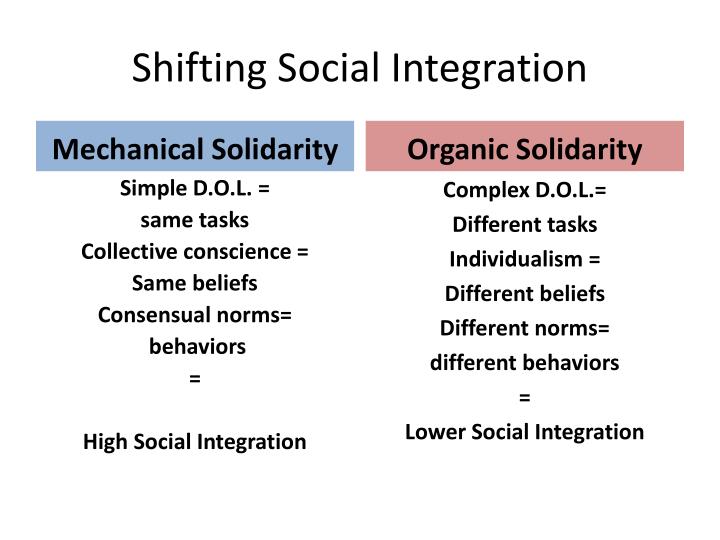Imagine a world without shared values, without a sense of belonging, without the comfort of knowing your community has your back. It’s a frightening thought, isn’t it? But it’s precisely the kind of world that sociologist Émile Durkheim warned against. Durkheim, a pioneer in the field of sociology, saw that a sense of solidarity, of shared purpose and connection, was crucial for a society to thrive. He argued that without it, societies would crumble under the weight of individual needs and desires.

Image: theoryrocks101b.blogspot.com
This article delves into Durkheim’s concept of solidarity, exploring its different forms, its impact on social stability, and its relevance in today’s globalized world. We’ll break down the complexities of this idea into digestible chunks, using real-world examples to show how solidarity plays out in our own lives, from our families and workplaces to our political and cultural landscapes.
A Journey Through Two Types of Solidarity
Durkheim identified two key forms of solidarity: mechanical and organic. He compared these forms to the ways different types of organisms function.
-
Mechanical Solidarity is the glue that binds more traditional societies together. It’s a kind of tribal solidarity where individuals are deeply interconnected through shared beliefs, customs, and values. In this type of society, there is a profound sense of “we-ness,” and individual distinctiveness is minimized. Think of small, rural communities where everyone knows everyone, where shared traditions reign supreme, and where deviation from social norms is met with swift disapproval.
-
Organic Solidarity emerges in modern, complex societies. Instead of shared tradition, it’s a shared interdependence that binds individuals. We each specialize in different roles, relying on one another’s skills and contributions to create a functioning whole. This complex network of relationships operates like a living organism, with each part playing a vital role. Think of a bustling metropolis where individuals are connected through complex interactions, each contributing to a intricate, interdependent ecosystem.
The Power of Shared Beliefs: Understanding Mechanical Solidarity
Imagine a tight-knit community in a small village, where everyone knows their neighbors by heart and the ringing of the church bell is a familiar call to prayer. This is a classic example of a society bound by mechanical solidarity. Durkheim believed that in such societies, the collective conscience exerted a powerful influence. This collective conscience is the shared set of beliefs and values that dictate what is considered right and wrong, acceptable and unacceptable. Breaking these unwritten rules, or deviating from the shared beliefs, carries a heavy social cost.
In the village example, individuals are held together by shared religious practices, common agricultural activities, and a collective memory of shared struggles and triumphs. These shared experiences and beliefs create a sense of strong belonging, but also restrict individual expression. Every action, even the most mundane, is seen through the lens of its impact on the group.
The Interdependence of Modernity: Unpacking Organic Solidarity
As societies become more complex and specialized, the nature of social bonds evolves. We move from a world of shared traditions to one of interdependent relationships. Organic solidarity, as Durkheim termed it, emerges from the interactions between individuals who specialize in different areas of expertise.
Think of a hospital, a bustling hub of specialized knowledge and skills. Doctors, nurses, technicians, and administrators all rely on one another, their work intricately interwoven. Each person contributes a unique skill set, forming an interconnected network that keeps the whole system operating. This interdependence is the heart of organic solidarity.

Image: metek.me
Navigating the Challenges:
Durkheim’s theories may seem outdated in a world consumed by rapid globalization and social change. But his insights remain surprisingly relevant. While he celebrated organic solidarity as the hallmark of modern societies, he also saw its challenges.
As societies grow more diverse and complex, it becomes increasingly difficult to maintain a sense of shared values and a sense of belonging. This can lead to social fragmentation, isolation, and even social unrest. In this landscape, it’s crucial to cultivate a sense of solidarity that transcends our differences and embraces the strength that comes from living in a diverse and interconnected world.
Building Bridges: Making Solidarity Relevant
So how do we, as individuals and societies, foster a sense of solidarity in our complex and fragmented world?
Reconnection through Shared Purpose: One way is to find common ground through shared projects and goals. Whether it’s volunteering in your community, participating in a social movement, or simply engaging in meaningful conversations with those who hold different perspectives, finding common purpose can spark connection and build shared understanding.
Embracing Collaboration: In a world where information flows freely and knowledge is shared instantly, collaboration is essential for progress. Working together on shared projects, seeking solutions to common challenges, and sharing resources can strengthen bonds and foster a sense of collective responsibility.
Creating Inclusive Communities: Fostering a sense of belonging and inclusion for all is vital. This means acknowledging and valuing the diversity of beliefs, cultures, and experiences that contribute to a thriving society.
Durkheim Solidarity
In Conclusion
Durkheim’s enduring message emphasizes the crucial role of solidarity in social stability. His concepts offer us a lens through which to examine the challenges and opportunities of our modern world. By understanding the concepts of mechanical and organic solidarity, we can cultivate a sense of community and purpose in an increasingly interconnected world. We can build bridges that connect us across differences, harness the power of shared purpose, and embrace the enduring power of solidarity, the invisible bonds that hold us together.






